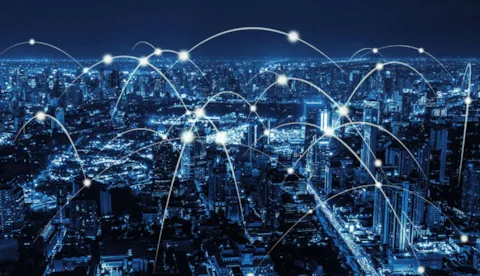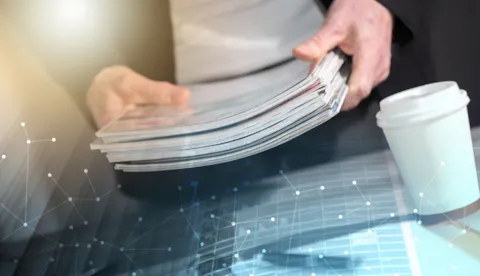Aleksandar Babic, Principal engineer
I joined DNV and the GRD Healthcare Programme in August 2022. My previous experience includes a PhD in biomedical engineering and many years of industrial R&D in various industries and projects, such as 3D cameras and cardiac ultrasound. The projects provided me with hands-on experience with AI development, from concept to deployment.
My role at DNV is to understand the challenges associated with the implementation of AI in healthcare, including concerns about the developmental and regulatory aspects that impede or enable its safe and effective adoption. Building international networks to develop initiatives and projects on trustworthy and explainable AI in healthcare, including bias, data quality and access, privacy, algorithm development, and robustness, is also part of the effort.
I'm very proud to be a part of DNV and a member of such a dedicated and capable team. I am excited about the opportunity to shape DNV's healthcare research activities and lay the groundwork for scientific legitimacy to future assurance requirements
Fan Elvis Wu, Principal Researcher
I joined the GRD Artificial Intelligence Research Centre in September, 2019. Prior to joining DNV, I worked on deep learning and face recognition in an AI start-up. My education background is in computer science and physics. On the DNV journey, I have participated in the development of NDT.ai, Corrosion.ai and the test kits for AI assurance, along with our creative and inspiring colleagues.
AI is still young. But the most fascinating part, is her ability to grow up. In mechanism, she absorbs the experience from human experts. But we still need to limit her playground, for safety and compliance requirements. Once in the wild, she should know when to ask for help. On the other hand, she also needs to grow up from the collaboration with humans. These are all exciting research areas, including AI assurance, continuous assurance and adaptive AI.
DNV has a perfect position to solve these challenges and deliver value to our customers. And I am proud to get on this board.
Ida Synnøve Bukkholm, Researcher
I joined the Low Carbon Technology group in GRD Energy Systems in June 2021. I joined DNV directly following my master thesis in Chemical Engineering. Since joining DNV and GRD, my work has been varied and very exciting; I have worked on data gathering for carbon capture value chains, been part of the hydrogen deep dive ETO, worked on developing a tool for comparing transportation and storage methods for hydrogen and been a part of the Next Generation Summit, just to mention some of it.
I am proud to be a part of the diverse Energy Systems team, I am impressed by the dedication and curiosity in the team. During the coming years we will see the knowledge and technology in the renewable industry developing, with new energy carriers like hydrogen and ammonia growing in the market. I am motivated by being a part of that transition.
I am eager to learn more and develop further in GRD, and hopefully our work can contribute to an accelerated energy transition.
Ingvild Budal Jacobsen, Researcher
I joined DNV and the Digital Assurance Research Center (DA-RC) in December 2021 as a research assistant following the graduation from my master's degree in innovation studies. After getting to work with interdisciplinary research on various topics related to the global transformations, I was thrilled to learn of the opening for a position as a researcher in the DA-RC, a position I have now held since August 2022.
At DNV, my role is to further the understanding of how the provision of assurance can attend to the emerging trust needs at the intersection of the digital and green transformation (the twin transformations) and how this impacts DNV's roles, as well as the challenges and opportunities this poses for value creation.
The twin transformations highlight the interconnectedness between the green and digital transformation that affect societies, industries, and firms. The digital transformation provides us with capabilities to leverage digital technologies to solve global challenges. While analytically, these two types of transformations have been addressed mainly separately in the existing literature, firms and industries as well as all other societal actors experience them simultaneously. My research will therefore focus on exploring the dynamics and nature of the twin transformations and how this affects firms in their activities, innovation processes and value creation.
Lisa-Victoria Bernhardt, Senior Aquaculture Researcher
I joined the DNV Ocean Space team in GRD in May 2022. My background is in Veterinary Medicine (DVM) with a PhD in aquaculture sustainability, fish health and -welfare, environmental monitoring (eDNA/eRNA), epidemiology and aquatic biosecurity.
The ocean is our planet’s largest ecosystem and an essential component of our global life-support system. As our forecast shows, the human activities making up the Blue Economy will continue to accelerate towards 2050, providing economic value and jobs. My research is mainly focused on shaping and accelerating the sustainable growth of aquaculture along with other ocean-based industries and improving our understanding in how they interact with each other and how they impact the ocean health.
This year I have focused mostly on the DigiHeart project which aims to develop machine learning models to uncover the relationship between heart morphological deviations and mortality in salmonids. Moreover, my work has also consisted of contributing to the Ocean Space Forecast 2022 and exploring the field of marine biodiversity.
I am excited to learn more and to develop the work for aquaculture sustainability further. Additionally, I feel happy about my choice to work for DNV that offers a great working environment with kind-hearted and dedicated colleagues.
Luman Zhao, Researcher
I joined Emerging Technology in Group Research and Development in July 2022. Prior to joining DNV, I worked as a post-doctoral researcher in the field of digital twin technology for ship intelligence. In my research, model-based methods and data-driven methods are combined to study the efficiency and feasibility of ship intelligent systems.
Autonomous systems based on AI need to gain the confidence and trust from the end users and the general public. In our group, we focus on exploring and developing new technologies for the assurance of assets containing AI/ML and advanced algorithms. One of the topics that I am interested in is the interpretability and explainability of Reinforcement Learning models. Since joining, I have been involved in projects that deploy such methodology to solve navigation problems.
DNV provides a fantastic platform for people to grow and thrive in their domain of expertise. I am grateful to meet many talented colleagues around me and together we can inspire new innovations at a faster pace and stay ahead of the competition. I am looking forward to the new challenges yet to come and contribute to the digital transformation around us.
Oleksii Ivanshenko, Researcher
I joined the GRD Maritime as a researcher of emissions from future marine fuels. My goal is to answer the question “How direct measurement and transparent reporting of emissions leads to reducing emissions?”
State of the art in emissions reporting today consists of an indirect estimation of CO2 production based on the fuel consumption and subsequent manual reporting.
To change this approach, I will use my experience with in-situ spectroscopic measurements, to determine a suitable Continuous Emissions Monitoring system (CEMs). Such CEMs would allow for a direct, real-time overview of all emissions, both Green House Gas (GHG) and local harmful pollutants. Most importantly it will take the industry away from labor-intensive manual reporting, ensure high data quality, reliability and increased transparency. Essentially, through the “compliance by the hour” mindset stakeholders will get a real-time feedback on whether we are on track to reach 2050 decarbonization goals.
The routines to measure emissions and report real-time compliance will be standardized in the new Recommended Practice within the ongoing Ammonia2-4 project.
Working in GRD Maritime team since August 2022, I have experienced that DNV researchers are committed to drive the ongoing energy transition towards better, greener shipping. So am I!
Sujeetha Selvakkumaran, Senior Researcher
I have over 12 years of experience modelling and scrutinizing energy systems and their impact on the world, environment and lives, at various scales; multi-regional, national and local. Coupled with my mechanical engineering degree and Ph. D in Energy Systems Modelling, I was more than happy to join the vibrant and diverse Energy Transition Outlook team in May 2021.
Despite the massive scope and ensuing complexities of the energy system, it is essential, and in fact necessary that a transition to a low carbon world happens sooner rather than later. It is a fulfilling experience to be part of a team that studies such a transition, especially in an organization such as DNV, which plays an active role in the said transition.
My current role is composed of making sense of global energy expenditures and affordability of energy, inter-regional power trade, and implementing sectors such as e-fuels and ammonia in the ETO. My hope is to actively contribute to a transformation of the energy system through DNV and its customers.

